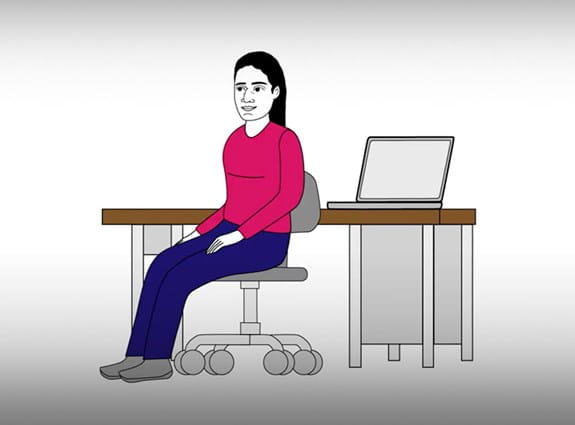Work and cancer
Narrator: Going back to work after cancer treatment can be hard. But there are ways to make it easier.
[The narrator appears on screen. She is a person with cancer. She is in the hospital, sitting in a chair and receiving chemotherapy through an IV in her arm. Next to her is a window with a view of houses.]
Narrator: I recently went back to work after taking some time off to have chemotherapy.
[As the narrator speaks, the treatment chair and the IV in her arm disappear. An office chair and a desk with a laptop appear in their place. The view outside the window changes to show the hospital in the distance. The scene ends.]
Narrator: I love my job. I like the routine, the people I work with and the interesting challenges.
[The narrator is at her desk in an office. She looks happy. Some of her co-workers appear on the left side of the screen. They are smiling. The scene ends.]
Narrator: Being back at work has helped me get back to normal. And many of my co-workers have been supportive, asking me how they can help or just offering a coffee and a smile.
[The narrator is at a large table across from one of her co-workers. Another co-worker appears holding out a coffee cup to the narrator. Everyone smiles. The scene ends.]
Narrator: Returning to work wasn't always easy. It was hard at first to reconnect with my team.
[The narrator is on the street in front of an office building. She looks a bit concerned. A thought bubble with 2 of her co-workers and the silhouette of another person appears above her head.]
Narrator: I felt like people were treating me differently. And there were several new people around the office that I didn't know.
[As the narrator speaks, the focus zooms in on the thought bubble. Two other co-workers appear in the bubble. Then the silhouette transforms into the narrator, and she looks concerned. There is a question mark above her head. The scene ends.]
Narrator: It took some time to feel comfortable with my co-workers again. By law, I didn't have to tell them about the cancer. But over time I found that talking about my experience helped us feel less awkward.
[The narrator is sitting at a large table across from one of her co-workers. They both have coffee cups in front of them and are smiling at each other. The scene ends.]
Narrator: During treatment, I tried to keep working. I worked part time for the first 3 months, and it helped keep my mind off the cancer.
[The narrator is in the hospital, sitting in a chair and receiving chemotherapy through an IV in her arm. In front of her is a small table with a laptop. Next to her is a window with a view of houses.]
Narrator: But taking the next 3 months off was a relief. It gave me a chance to focus on my treatment and recovery.
[As the narrator speaks, the table with the laptop disappears. Her partner appears sitting in a chair in front of her. The narrator and her partner smile at each other. The scene ends.]
Narrator: Before I went back to work, my boss and I came up with a plan. With input from my healthcare team, we changed some of my responsibilities to help manage my fatigue.
[The narrator appears on the left side of the screen. She is looking at her smartphone. Then a line appears down the screen and her boss appears on the right side of the screen. She is also looking at her smartphone. There is a desk behind her. The computer screen shows “HR Policies.” The scene ends.]
Narrator: And we decided that I should start by working half days. Legally, employers must make reasonable changes like these to help you do your job during or after cancer treatment.
[A calendar shows Monday to Friday. On each day, different blocks of time are shown in different colours. Then the bottom half of each day becomes a single striped block. The scene ends.]
Narrator: Even with all of the planning, things still felt different once I was back in the office. But that's normal, and it will get easier with time.
[The narrator sits at her desk in front of a laptop. She is looking at the viewer and smiling. The scene ends.]
Narrator: For now, I'm taking each day as it comes, working but remembering to save energy for me, my family and my friends. Cancer reminded me that work is important – but it's not my life.
[The narrator is walking in the park. She is holding hands with her partner and her son. Her partner is pushing a baby stroller. The scene ends.]
Narrator: The Canadian Cancer Society is here to help. Visit cancer.ca or call us at 1-888-939-3333.
[The Canadian Cancer Society’s name, logo, phone number and website appear at the top of the screen. The Bank of Montreal (BMO) logo appears below as a proud sponsor of the Cancer Basics video series.]

